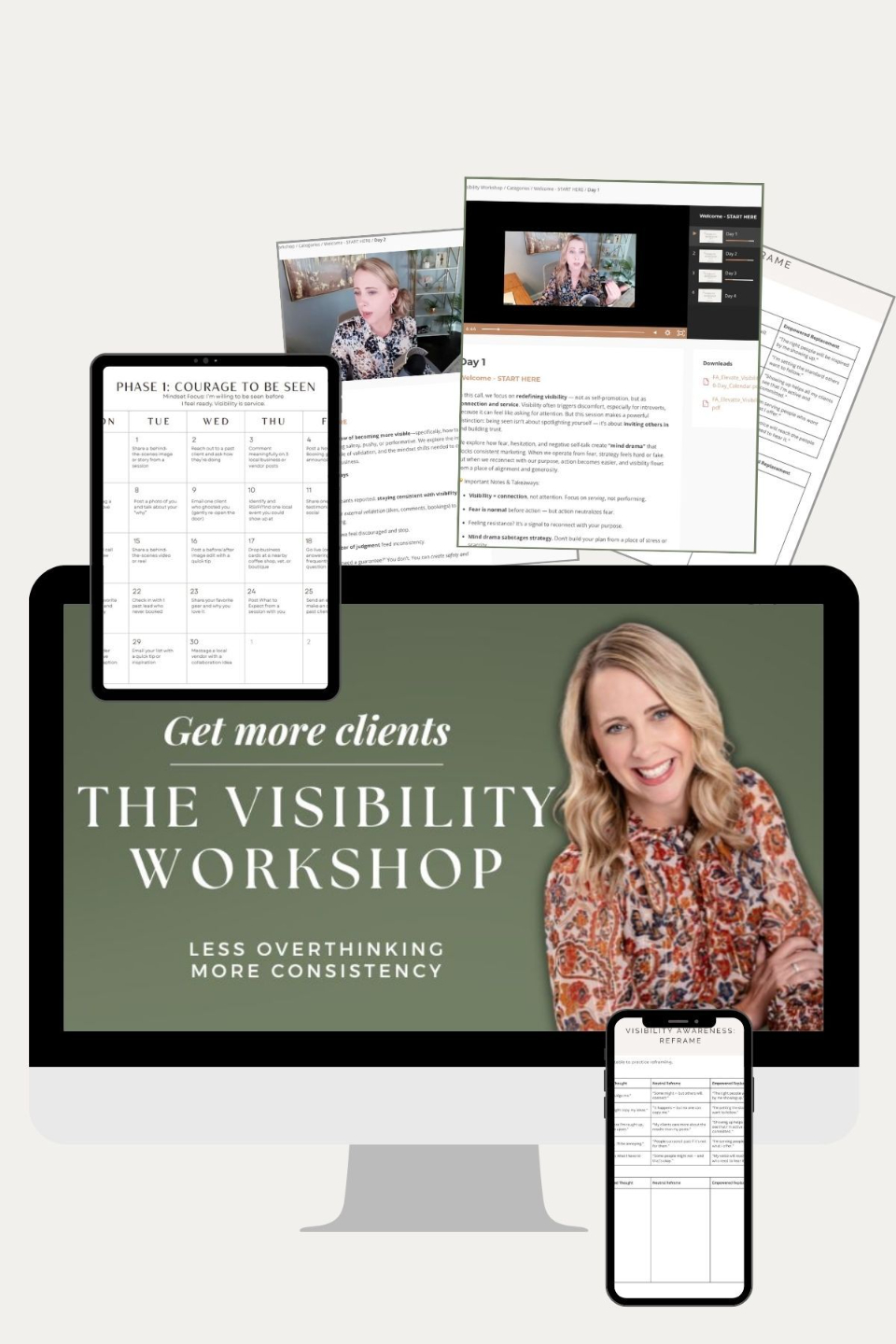Podcast Ep 343 - This one concept is saving my life right now.

In this episode of the Flourish Academy podcast, Heather Lahtinen shares a concept that's been a game-changer in her life—reducing cognitive load. With relatable examples and actionable advice, Heather dives into how mental clutter and unaddressed tasks drain your energy and limit your ability to focus on what truly matters.
By making small, intentional changes, you can reclaim your time, reduce stress, and create space for meaningful growth in your life and business. Tune in to discover how to manage your cognitive load and step into a more productive and peaceful version of yourself.
Show Notes:
- What is cognitive load, and how does it impact your life?
- Simple steps to reduce mental friction (like buying scissors for your garage!).
- Why "future you" is worth the effort today.
- How managing cognitive load benefits both your personal life and business.
- Practical tips for tackling small tasks to free up energy for bigger goals.
- The compound effect: How small, consistent actions lead to massive results.
How to Support the Podcast:
- Subscribe to the podcast on iTunes or wherever you listen to podcasts. Please like, share, and leave a review.
- If you like the content, please share with your friends by posting on social media so that we can reach and impact more people.
Connect:
Heather Lahtinen: Website, Facebook, Instagram
TRANSCRIPT
You're listening to the Flourish Academy podcast and today I'm sharing a concept that
has been saving my life lately. My name is Heather Lahtinen and I'm a photographer,
educator and entrepreneur and I founded the Flourish Academy as a resource for
photographers of all levels. We want to help you pursue your passion on your own
terms because we believe there is room for everyone. In this podcast, we focus on
creating breakthroughs with your mindset to discover the things that are really
holding you back in business and life. In episode 267,
I shared two concepts that were saving my life at the time, and you should
definitely check out that episode because those two things still hold true, and it
may sound dramatic, but I am a very passionate person and I am serious when I say
that this one concept I'm going to share with you is saving my life right now.
Okay. It's keeping me sane and helping me to manage my mind.
I am paying very close attention to my cognitive load or in question for them,
I'm asking myself, how can I reduce my cognitive load? It's like you have all of
these open tabs in your brain, all of these things to do, all of these lists,
things scheduled to do, not done, have to go here, do this, and they seep into
everything and drain all of the energy away from us. Cognitive load is the amount
of effort required to process information and the information that working memory can
process at any given time. And if I can reduce my cognitive load,
then it gives me more energy for the things that I deem more important.
So to reduce your cognitive load, for example, you could fix that handle it doesn't
work anymore. You could submit that paperwork, get your driver's license renewed, make
that doctor's appointment. Or for me, it's the appointment with the eye doctor
because your eyes have been bothering you lately. Okay. Here's the thing about that.
I stare at my computer. I'm on zoom all day with lights in my eyes and the doctor
is going to say, you need to step away from your computer. And I'm going to say,
well, you need to, you step away from something because I can't do that,
okay? Anyway, you have all of these open tabs that you are constantly facing.
So you could start by literally closing all of those tabs on your website browser.
As I am recording this, I currently have four open and these are the four things
that I use all day long. If I get more than than say six on my screen,
start to get squirrely, so I just close them. What if you could set aside a day?
I don't know, maybe not even a day, maybe four hours, six hours, whatever you can
do
and view it as like a detox day and complete all of these small open tabs,
or you could just always be paying attention to your cognitive load by asking
yourself, "Where am I feeling friction? Where are things happening that could be
distracting me even just a little bit?" So I have been paying attention to the
friction in my life. I've been asking myself the question, "How can I reduce my
cognitive load?" And I have this silly example, but when we get packages to deliver
to our home, which is very often, if there is a box that is in our garage and I
want to open the box in the garage to get the product out and then put the box
in the garbage, I have to walk all the way into the house, into the kitchen to
get the scissors, or maybe if I need a tape measure for something, I have to walk
all the way into the house to the coat closet in the foyer to get the tape
measure that I hide from everyone because they steal it. So the scissors and the
tape measure has just been really getting on my nerves yet. I am constantly doing
it. So I thought to myself, well, okay, or I could just purchase another pair of
scissors and a tape measure for the garage. And I don't know why this didn't occur
to me sooner, except that I just haven't been paying attention, which is why the
question is so important. So I am suggesting that you ask yourself every day,
"How can I reduce my cognitive load?" And then you take action to fix it. So I
now have a pair of scissors and a tape measure in the garage, and I've somewhat
hidden them so people don't steal them. Oftentimes, people feel very overwhelmed and
busy and scattered and as if nothing is getting done, which leads to stress and
anxiety and exhaustion because there is just so much to do.
But I am here to tell you that there is a better way.
For the most part, I, I simply just do not feel that overwhelm or like,
oh my gosh, there's so much to do. And that's because in my life, everything is
always done because I do all of these little things all the time and they add up.
So I benefit from the compound effect of doing the small things. So they don't,
they don't add up against me. They're actually, actually always done. So they're
adding up. How am I'm trying to say this, they're done, so it's adding up in my
favor. I was talking with a friend about this recently and I was telling her how I
never have laundry because it's always done. If there are clothes that need to be
washed, then I just wash them. It's not even a thing, it's just done. This connects
with my concept of taking care of future Heather, which I talk about often. I was
making lasagna one Saturday morning a few weeks ago. Oh, wait a minute, wait a
minute. It actually, I started it that Friday evening when I chopped all the
vegetables and Craig was like, wow, you are just always going. And I said,
I am not doing this. I am not working right now for current Heather. I do not
work for her. I work for future Heather, and I know that chopping these vegetables
will make it easier for her tomorrow morning and making the lasagna in the morning
will make it easier for her later in the day. And furthermore, a 13 by nine pan
of lasagna will feed us for two meals so I can freeze the other half for a day
when I need to make dinner, but maybe I'm really busy. Anyway, I was talking with
my friend about this concept and how I never put anything off. Well, I just don't
like loose ends. And so everything is always done. But then she had a good
question, interesting, very thought provoking. She said, but doesn't that mean that
you are always working because current Heather works for future Heather,
which is just a rolling version of yourself. So you're always working. And I
thought, man, that's a good point. But in reality, that's just not how it plays out
because actually it feels like the exact opposite. It feels like I'm never working
and things are always done because I'm always working to get things done. I know it
might not make any sense, But it's true. It's like always doing the laundry means I
never have laundry because it's always done It does not feel like I am constantly
working or doing things. It feels to me Like everything is just always taken care
of because it is I love the thought of reducing mental friction or cognitive load
and I mean doesn't that sound fun? It's not It's not something you want to do, but
the reason is because it gives me the capacity to do the things that I really need
and want to do, both in my life and my business. You currently don't have the
capacity to pursue your dreams or at the very least a better version of yourself
because your cognitive load is too great. I think exercise is another way to reduce
your cognitive load because then your brain doesn't have to worry about your body or
wonder whether you're going to take care of it or not. It's just one less thing to
think of. Now, if we're talking about being a photographer and running a business, I
would ask myself, what could I do to reduce my cognitive load? Maybe it's just that
you sit down for 30 minutes to finish and commit to your pricing, keeping in mind
that it's not permanent and it can always be changed. Or replying to that email
that you know you need to take care of or making that phone call or reaching out
to that business, you are most likely giving yourself entirely too much time.
And the problem with that is that it adds to your cognitive load. When if you
would just take the five minutes to get it done, you would feel so relieved, so
much lighter, and then you would have the space and capacity to do something more
important. Putting things off is only and always adding to your cognitive load, and
it's slowing you down more than you realize. It's using up your precious and limited
energy that really should be focused on bigger and more important things. Can you
imagine what it would be like to have more energy and focus to really move your
business forward. And I would argue that it also means that you have more time.
Ask me how I know this, because I own time and I always have plenty of it. And
what if it's as simple as getting scissors for your garage? As you're listening to
this, I hope you are asking yourself, How can I reduce my cognitive load? You've
come up with a few things. Now. Just go do them. I Hope that you found this
useful. I'll see you in the next episode






